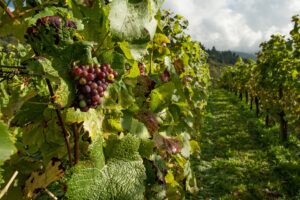All materials in these studies that are not otherwise attributed are © 2014 by Tool Box for Faith. Expressed permission is hereby granted to download and print these materials for personal/congregational use only. If you wish to use any of these materials for any other groups or other purposes, please contact us (gennowdisciples@gmail.com) for permission. In all cases, include this copyright notice and email address with any versions of the material. Thank you.
Section 1: Opening Prayer
(A prayer of Ignatius of Loyola c. 1491–1556)
Teach us, good Lord God, to serve you as you deserve, to give and not to count the cost, to fight and not to heed the wounds, to toil and not to seek for rest, to labor and not to ask for reward, except that of knowing that we do your will, through Jesus Christ, our Savior and Lord.Amen.
Section 2: What’s a Parable?
A pair of bowls? No! A parable!
A parable is a story that someone tells to make a point beyond the story itself. The story is most often untrue, and for all we know, all of Jesus’s parables were fictional stories. They didn’t happen in history. But this doesn’t mean they’re untrue. This sounds like an absurd statement, that something didn’t happen but that it is a true story. But we tell these kinds of stories all the time to prove points.

Sometimes they’re about historical figure. You know that story about George Washington cutting down his family’s cherry tree with his brand new hatchet but being honest about it when his father confronted him? It never happened. It’s a story made up by one of Washington’s earliest biographers, a guy named Mason Locke Weems. In trying to convey the truth of Washington’s honesty and integrity, Weems made the story up to prove a point. Most people just don’t realize that it’s a myth, a parable, instead of a historical event. Washington’s honesty is true, even if the story didn’t happen.
At other times we just make up stories altogether. Perhaps you’re familiar with The Boy Who Cried Wolf, where a boy lies about a wolf’s appearance so many times that, when a wolf really does show up, no one believes him. Someone made up this story to impress upon children the importance of telling the truth and not deceiving those who can help you. Aesop’s Fables, a large set of moral stories, perform the same kind of work.
They’re also stories that sound familiar to the hearers. Jesus uses lots of parables that reference farming and agriculture because many of his listeners were familiar with that way of life. Our parable today, of workers in a vineyard, would sound quite similar to the experiences of 1st century Hebrews who worked in vineyards, made wine and ate fruit from those vineyards, or walked past those vineyards on their way to work or temple. Since we might not be as familiar with vineyards or farming, it’s sometimes helpful to read these parables alongside people who’ve lived and worked in settings similar to the story Jesus is telling. That can help us more accurately understand the truth that Jesus is trying to tell us.
Ultimately, Jesus uses parables to teach people about truth, God’s truth, through stories that can connect with anyone. Since they’re not historical stories, hearers could imagine themselves as any of the characters in the parable. That way, the deep truth of the story can connect with all of the hearers.
Section 3: Faith With(out) Works
First, take a minute to read Matthew 21:33-46. You can use your own Bible or read it here.
Then, give it a watch!
https://www.youtube.com/watch?v=2lqbUup_dR0 One of the things that Lutherans struggle with is the relationship between our faith and good works. We rightly emphasize that we can’t earn our salvation. In other words, God gives us eternal life as a gift. To say that works earn God’s love both overestimates what our works can do and underestimates the way that God loves us. This is right.

What’s wrong is when we assume that good works play no role in our faith at all. In this parable, Jesus makes clear that our behavior matters. In the parable, the servants’ behavior reveals that they don’t respect their master or the messengers the master sends. But the master loves the vineyard and wants goodness to thrive there. The master wants good fruit to grow in the vineyard and to feed those who live in that land. The servants are meant to help that to happen, but instead, they rebel to prevent the master’s plan from coming alive. Their works affect their relationship with the master and the vineyard in which they live.
But is that the whole point of the parable? No. Parables may teach us something about our own lives today but they’re often pointing to God’s activity or God’s kingdom. The parable shows us not only that our actions can have negative affects, but that God will make sure salvation happens even if we want to stand in the way.
Jesus concludes the parable with, “the last will be first and the first will be last.” Notice that it doesn’t say those who were originally first would never experience God’s kingdom. Instead, it says that they will switch places with those last in line. If you’re last in line at a theme park, you still get to enter. You’re just not riding the roller coasters first. Our works to don’t get us into heaven. But our works do reveal how we understand and appreciate the gift of salvation that God shares with us. We should never believe that our works earn us salvation, but we should never assume works don’t matter to our faith.
But is that the whole point of the parable? No! Who does the master sound like? Someone constantly sending us messengers that we ignore, abuse, and even kill? Someone who loves us enough to share a fertile piece of land with us even when we’re refusing that love and refusing the gifts we’re offered?
Section 4: What Does This Mean?
This image of God’s love is a key for us all. Nothing, not even our own selfishness, can prevent God’s salvation from coming to our world, which is the vineyard which God gave to us, in which God calls us to work, and from which God calls us to share. The inversion of the world, where the last will be first and the first will be last, one of God’s mysterious ways of accomplishing justice. God’s grace flips the world upside down, which truly is grace. It’s not just grace for those who were last but become first. It’s also grace for those who were first but become last.

We see this because God, who is first, becomes last on the cross. That’s the ultimate image of this parable. The master sends his own son, hoping that this personal and intimate connection will restore relationship between himself and the rebellious workers. Yet, rather than accept the heir, they kill him. God sends Jesus to us, the only child of God, to reconcile all people and all creation with God our creator. Yet, rather than embrace Jesus as the way, the truth, and the life that we all need, instead we crucify him. God, who is first, is treated as the very last and least of all. In that act, God forgives us. We’d expect that God would respond like the master, punishing us for our terrible misdeeds. But instead, the only thing that God puts to death in us is sin. That’s what forgiveness is: the death of sin. God forgives us and gives us new life. A new life where the last become first and the first become last.

For those who were last, the equality brought by Christ feels like bring brought to the front of the line. Here’s the thing about equality for people who are privileged: it feels unfair, like a roller-coaster that always rides upside down. It turns everyone’s world upside down, but that’s alright, because it’s God’s world. It feels like oppression because the advantages that once made us first melt away in the rising sun of Christ’s light. Yet, that is God’s grace. Our fear will no longer lead to the death of others. Our rage won’t lead to our death. Our selfishness will no longer mean we ignore God’s good will for the vineyards where we work. God won’t let us get in the way of God’s good gifts for us or anyone else anymore.
Ultimately, while this parable tells us that works matter to our faith, the central point is about God’s work. God knows that we will struggle, that sin will rear its ugly head in our lives, that no matter how much our faith means to us, sometimes our works just won’t reflect that. So, God saves us, not just from sin, death, and the devil, but from ourselves. We just shouldn’t be surprised when that leads to a leveling of our world.
Section 5: Closing Prayer
Almighty God, you have called us to labor in your vineyard, and without you we can do nothing. Grant your gracious presence at this meeting, that what we do will build up your whole church. Let your Holy Spirit govern and direct us, that we may consult together peacefully, pleasing you with all that we say and do; through Jesus Christ, our Savior and Lord.Amen.
Opening and Closing Prayers from Sundays and Seasons.com. Copyright 2017 Augsburg Fortress. All rights reserved. Reprinting by permission under Augsburg Fortress Liturgies Annual License #25165.